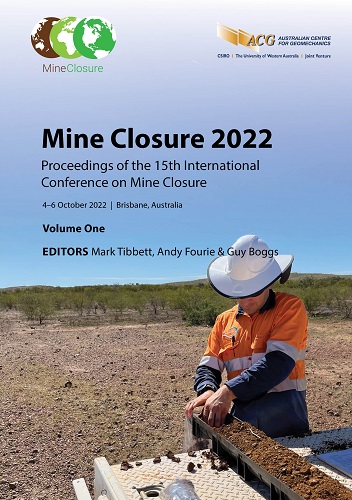Converting an idle coal mine into a renewable energy complex

|
Authors: Saffron, BD |
DOI https://doi.org/10.36487/ACG_repo/2215_91
Cite As:
Saffron, BD 2022, 'Converting an idle coal mine into a renewable energy complex', in AB Fourie, M Tibbett & G Boggs (eds), Mine Closure 2022: Proceedings of the 15th International Conference on Mine Closure, Australian Centre for Geomechanics, Perth, pp. 1231-1236, https://doi.org/10.36487/ACG_repo/2215_91
Abstract:
Working collaboratively with our client Montem Resources and other professional services firms, we have established a technically and financially viable project to convert an idle coal mine into a renewable energy complex. Tent Mountain is in the Canadian province of Alberta, and the open pit coal mine at the mountain ceased operations in 1983. Montem Resources was looking to recommence operations; however, the mining restart project has been met with significant permitting issues. The challenge from Montem was to find a way to create a strong economically, sustainably, and sociably accepted project that would attract investment and utilise the unique features of the Tent Mountain site and location. The resulting conversion project is named the Tent Mountain Renewable Energy Complex (‘TM-REX’) and includes a 320 MW pumped hydro energy storage facility, a 100 MW green hydrogen production electrolyser, and a 100 MW wind farm offsite (originally considered onsite). The large-scale pumped hydro energy storage and green hydrogen of TM-REX help address climate change and support energy transition adoption and societal changes. Additionally, and importantly, the project captures the opportunity to promote Indigenous participation. The TM-REX leverages Montem Resources’ existing mining assets, notably the intact historical ‘Upper Reservoir’ near the top of Tent Mountain some 300 m above the valley floor below, along with access to requisite infrastructure, including major rail lines, high-voltage power lines, natural gas pipelines, and the interprovincial highway. The addition of large-scale energy storage for the pumped hydro is important to enable further investment by private companies in additional wind and solar power generation in Alberta. As a result, the pumped hydro asset will act as a catalyst for further investment in Alberta and for continued decarbonisation of the electricity grid. As a first of its kind in Alberta, the hydrogen portion of the project will lead the way in building partnerships and demonstrate the viability of green hydrogen projects to public and private stakeholders. The displacement of fossil fuels with hydrogen will significantly reduce emissions. The proposed full-scale, 100 MW facility will produce enough hydrogen to displace approximately 50 million litres of diesel, reducing approximately 200,000 t of CO2 emissions each year, as well as bringing new jobs to the region. Indigenous participation is another key facet of the project, and while onsite wind production was reviewed and remains possible, it was determined that offsite higher efficient wind resources that could leverage Indigenous group project development goals are the optimal opportunity to pursue. The result is the early stages of a compelling and transformational project for both Montem Resources and the Tent Mountain site from an idle coal mine to a renewable energy complex.
Keywords: conversion, renewables, hydrogen, transition, green
References:
Alberta Electric System Operator 2016, Guide to understanding Alberta’s electricity market, viewed 1 May 2022,
aeso/continuing-education/guide-to-understanding-albertas-electricity-market/
Fletcher, R 2021, ‘Instead of a coal mine, this Alberta mountain may now become a “green energy complex”’, CBC, viewed 1 May 2022,
© Copyright 2026, Australian Centre for Geomechanics (ACG), The University of Western Australia. All rights reserved.
View copyright/legal information
Please direct any queries or error reports to repository-acg@uwa.edu.au
View copyright/legal information
Please direct any queries or error reports to repository-acg@uwa.edu.au
